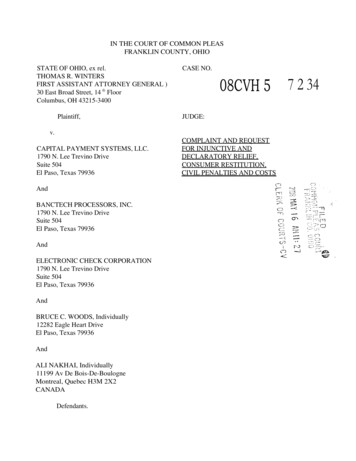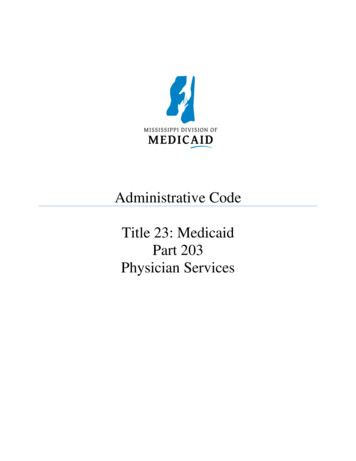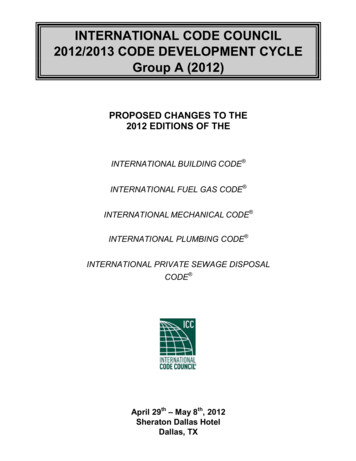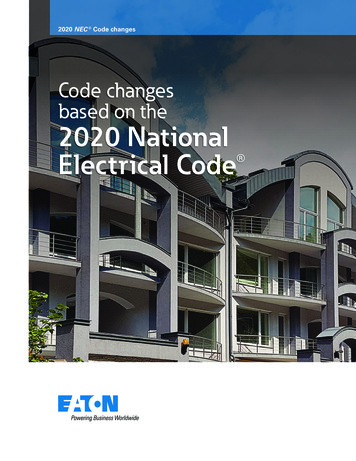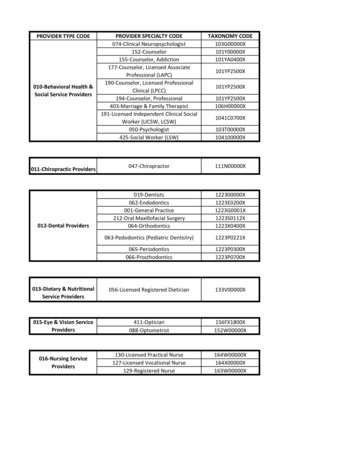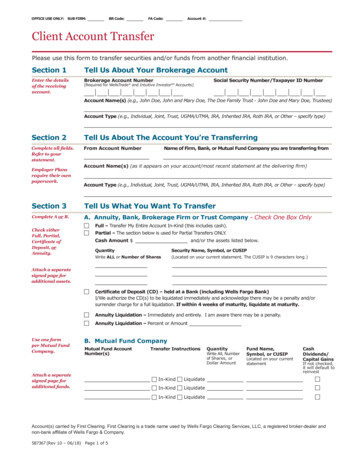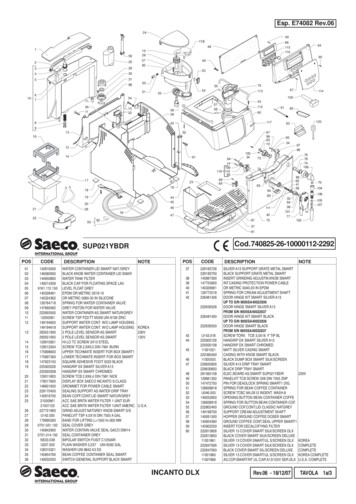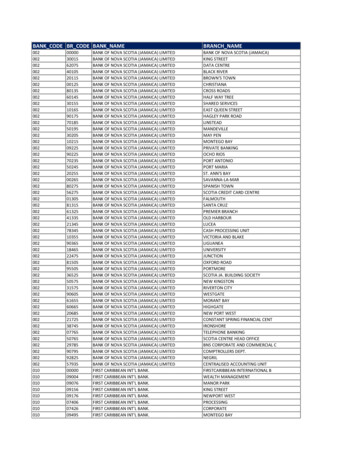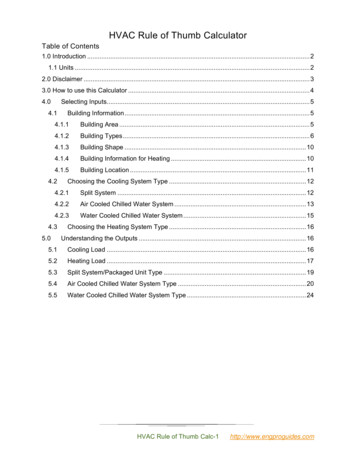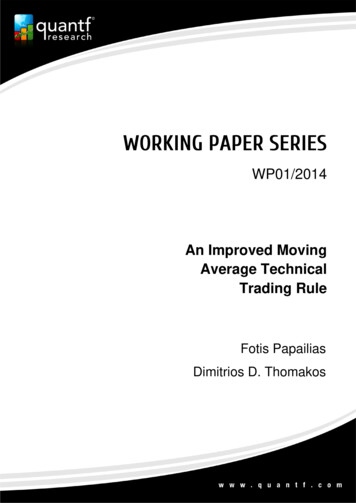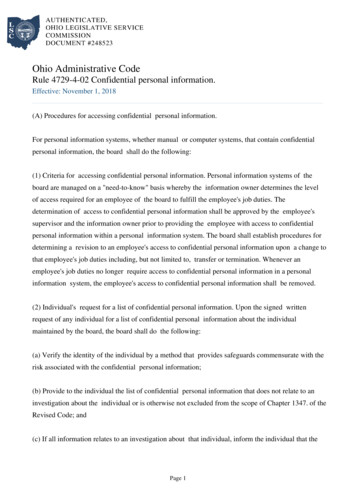
Transcription
Ohio Administrative CodeRule 4729-4-02 Confidential personal information.Effective: November 1, 2018(A) Procedures for accessing confidential personal information.For personal information systems, whether manual or computer systems, that contain confidentialpersonal information, the board shall do the following:(1) Criteria for accessing confidential personal information. Personal information systems of theboard are managed on a "need-to-know" basis whereby the information owner determines the levelof access required for an employee of the board to fulfill the employee's job duties. Thedetermination of access to confidential personal information shall be approved by the employee'ssupervisor and the information owner prior to providing the employee with access to confidentialpersonal information within a personal information system. The board shall establish procedures fordetermining a revision to an employee's access to confidential personal information upon a change tothat employee's job duties including, but not limited to, transfer or termination. Whenever anemployee's job duties no longer require access to confidential personal information in a personalinformation system, the employee's access to confidential personal information shall be removed.(2) Individual's request for a list of confidential personal information. Upon the signed writtenrequest of any individual for a list of confidential personal information about the individualmaintained by the board, the board shall do the following:(a) Verify the identity of the individual by a method thatprovides safeguards commensurate with therisk associated with the confidentialpersonal information;(b) Provide to the individual the list of confidentialpersonal information that does not relate to aninvestigation about theindividual or is otherwise not excluded from the scope of Chapter 1347. of theRevised Code; and(c) If all information relates to an investigation aboutthat individual, inform the individual that thePage 1
board has no confidentialpersonal information about the individual that is responsive to theindividual's request.(3) Notice of invalid access:(a) Upon discovery of or notification that confidentialpersonal information of a person has beenaccessed by an employee for aninvalid reason, the board shall notify the person whose informationwasinvalidly accessed as soon as practical and to the extent known at the time.However, the boardshall delay notification for a period of time necessary toensure that the notification would not delayor impede an investigation orjeopardize homeland or national security. Additionally, the board maydelay thenotification consistent with any measures necessary to determine the scope ofthe invalidaccess, including which individuals' confidential personalinformation was invalidly accessed, and torestore the reasonable integrity ofthe system."Investigation" as used in thisparagraph means the investigation of the circumstances andinvolvement of anemployee surrounding the invalid access of the confidential personalinformation.Once the board determines that notification would not delay orimpede an investigation, the boardshall disclose the access to confidentialpersonal information made for an invalid reason to theperson.(b) Notification provided by the board shall inform theperson of the type of confidential personalinformation accessed and thedate(s) of the invalid access.(c) Notification may be made by any method reasonablydesigned to accurately inform the person ofthe invalid access, includingwritten, electronic, or telephone notice.(4) Appointment of a data privacy point of contact. The board executive director shall designate anemployee of the board to serve as the data privacy point of contact. The data privacy point of contactshall work with the chief privacy officer within the office of information technology to assist theboard with both the implementation of privacy protections for the confidential personal informationthat the board maintains and compliances with section 1347.15 of the Revised Code and the rulesadopted pursuant to the authority provided by that chapter.Page 2
(5) Completion of a privacy impact assessment. The board executive director shall designate anemployee of the board to serve as the data privacy point of contact who shall timely complete theprivacy impact assessment form developed by the office of information technology.(B) Valid reasons for accessing confidential personal information.Pursuant to the requirements of division (B)(2) of section 1347.15 of the Revised Code, this rulecontains a list of valid reasons, directly related to the board's exercise of its powers or duties, forwhich only authorized employees of the board or board members may access confidential personalinformation (CPI) regardless of whether the personal information system is a manual system or acomputer system.(1) Performing the following functions constitute valid reasons for authorized employees ormembers of the board to access confidential personal information:(a) Responding to a public records request;(b) Responding to a request from an individual for the listof CPI the board maintains on thatindividual;(c) Administering a constitutional provision orduty;(d) Administering a statutory provision orduty;(e) Administering an administrative provision orduty;(f) Complying with any state or federal programrequirements;(g) Processing or payment of claims or otherwiseadministering a program with individualparticipants orbeneficiaries;(h) Auditing purposes;Page 3
(i) Licensure processes;(j) Investigation or law enforcement purposes;(k) Administrative hearings;(l) Litigation, complying with an order of the court, orsubpoena;(m) Human resource matters, including hiring, promotion,demotion, discharge, salary orcompensation issues, processing leave requestsor issues, time card approvals or issues, and payrollprocessing;(n) Complying with an executive order orpolicy;(o) Complying with a board policy or a state administrativepolicy issued by the department ofadministrative services, the office ofbudget and management or other similar state agency; or(p) Complying with a collective bargaining agreementprovision.(2) To the extent that the general processes described in paragraph (A) of this rule do not cover thefollowing circumstances, for the purpose of carrying out specific duties of the board, authorizedemployees, contractors and board members would also have valid reasons for accessing CPI in thesefollowing circumstances:(a) Conducting a review of individuals who may be potentialwitnesses or other sources ofinformation in a criminal or administrativeproceeding;(b) Administering the dangerous drug database also known asthe "Ohio Automated Rx ReportingSystem" or"OARRS";(c) Inspection purposes;(d) Administering board orders; orPage 4
(e) Research performed for official duties.(C) Confidentiality statutes, regulations, and rules.The following federal statutes or regulations or state statutes or administrative rules make personalinformation maintained by the board confidential and identify the confidential personal informationwithin the scope of rules promulgated by this board in accordance with section 1347.15 of theRevised Code:(1) Social security numbers: 5 U.S.C. 552a (12/19/2014), unless the individual was told that thenumber would be disclosed.(2) "Bureau of Criminal Identification and Investigation" criminal records check results: section4776.04 of the Revised Code.(3) Student education records: 20 U.S.C. 1232g (1/14/2013).(4) Dangerous drug database information: division (C) of section 4729.79 of the Revised Code.(5) Personal health information: 45 C.F.R. 164.502 (1/25/2013) from the federal "Health InsurancePortability and Accountability Act of 1996 (HIPAA)."(6) Substance abuse treatment records: section 5119.27 of the Revised Code and 42 U.S.C. 290dd-2(7/20/2016).(7) Records of dangerous drugs and controlled substances: section 3719.13 of the Revised Code.(8) Security or infrastructure records: division (B) of section 149.433 of the Revised Code.(9) Information or records that are attorney client privileged: division (A)(1) of section 2317.02 ofthe Revised Code.Page 5
(10) Mediation communications or records: section 2710.03 of the Revised Code.(11) Trial preparation records: division (A)(1)(g) of section 149.43 of the Revised Code.(12) Court filings: Rule 45(D)(1) of the rules of superintendence for the courts of Ohio.(13) Section 4729.23 of the Revised Code.(D) Restricting and logging access to confidential personal information in computerized personalinformation systems.For personal information systems that are computer systems and contain confidential personalinformation, the board shall do the following:(1) Access restrictions. Access to confidential personal information that is kept electronically shallrequire a password or other authentication measure.(2) Acquisition of a new computer system. When the board acquires a new computer system thatstores, manages or contains confidential personal information, the board shall include a mechanismfor recording specific access by employees of the board to confidential personal information in thesystem.(3) Upgrading existing computer systems. When the board modifies an existing computer systemthat stores, manages or contains confidential personal information, the board shall make adetermination whether the modification constitutes an upgrade. Any upgrades to a computer systemshall include a mechanism for recording specific access by employees of the board to confidentialpersonal information in the system.(4) Logging requirements regarding confidential personal information in existing computer systems.(a) The board shall require employees of the board whoaccess confidential personal informationwithin computer systems to maintain alog that records that access.Page 6
(b) Access to confidential information is not required tobe entered into the log under the followingcircumstances:(i) The employee or contractor of the board is accessing confidential personal information forofficial board purposes, including research, and the access is not specifically directed toward aspecifically named individual or a group of specifically named individuals.(ii) The employee of the board is accessing confidential personal information for routine officeprocedures and the access is not specifically directed toward a specifically named individual or agroup of specifically named individuals.(iii) The employee of the board comes into incidental contact with confidential personal informationand the access of the information is not specifically directed toward a specifically named individualor a group of specifically named individuals.(c) The employee of the board accesses confidentialpersonal information about an individual basedupon a request made under eitherof the following circumstances:(i) The individual requests confidential personal information about himself or herself.(ii) The individual makes a request that the board take some action on that individual's behalf andaccessing the confidential personal information is required in order to consider or process therequest.(d) For purposes of this paragraph, the board may choosethe form or forms of logging, whether inelectronic or paperformats.(5) Log management. The board shall issue a policy that specifies the following:(a) Who shall maintain the log;(b) What information shall be captured in thelog;Page 7
(c) How the log is to be stored;(d) How long information kept in this log is to beretained.(6) Nothing in this rule limits the board from requiring logging in any circumstance that it deemsnecessary.Page 8
Nov 01, 2018 · (c) How the log is to be stored; (d) How long information kept in this log is to be retained. (6) Nothing in this rule limits the b
